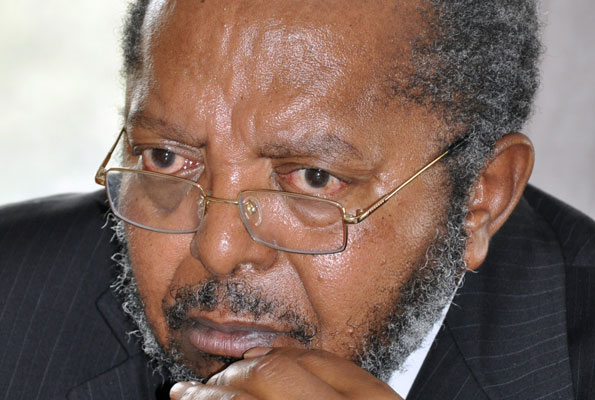The Uganda National Bureau of Standards (UNBS) has spoken out on the allegations that Bahari and Pearl salt brands are tasteless and don’t dissolve easily.
The above allegations were made by Kilak North County Member of Parliament, Gilbert Olanya (in featured photo with the salt brands in question) on the floor of Parliament last week.
He claimed that one has to pour huge quantities of the salt brands in question in the food in order to get the preferred taste compared to other brands in the market.
However, in an exclusive interview with Business Focus, UNBS rubbished the claims, saying that the salt was permitted on the Ugandan market after passing all the necessary tests.
“As UNBS, we are aware of the brands (Bahari and Pearl salt) on the market. The Mark on the brands indicates that they have been certified by KEBS (Kenya Bureau of Standards). As a measure to facilitate trade within the EAC, we recognize certification permits issued by Standards bodies in the EAC partner states. The salt was cleared based on valid certification permits from KEBS,” Godwin Bonge Muhwezi, the Head of Public Relations at UNBS said.
He added that after receiving the allegations about the brands, the standards agency did further analysis on the products and they passed all the tests.
“…as a quality assurance measure, UNBS picked samples from the market for further laboratory analysis and the tested samples passed,” Muhwezi said.
Business Rivalry Cited in the anti-Bahari, Pearl Salt
Our investigations reveal that there’s unprecedented rivalry between two salt brands; Habari Salt and Bahari salt.
The battle is akin to the one between Sadolin and Plascon that resulted from Japanese paint company, Kansai Plascon, buying off Sadolin Paints East Africa, which for over 50 years held the license for Sadolin Paints, a brand of Akzo Nobel from the Netherlands.
It is understood that Habari salt brand initially belonged to Dr. Hasmukh Dawda’s House of Dawda (Uganda) and House of Manji (Kenya). His salt company, Mombasa Salt Works was based in Mombasa Kenya which he started in 1975.
However, in 2007, he sold his Habari salt brand to Crystalline Salt Company belonging to another business man in Mombasa Kenya.
Thereafter, he came up with two new Brands; BAHARI and PEARL salt. The two brands belong to one Okapi Trading Co.Ltd, which is under House of Manji (Kenya) and House of Dawda(Uganda).
Considering the fact that Dawda had been in the market for decades, it was easy for him to market his new brands and even surpass the pioneer Habari brand which he had marketed himself.
He had all the market intelligence on his fingertips.
However, this didn’t go down well with the new Habari owners and distributors because Bahari and Habari have close similarities in name and branding.
This caused anxiety since customers who are not very vigilant can easily buy the other brand when he/she meant to buy the other.
A source told us that Dawda had a better advantage especially in Northern Uganda because he was born and raised up in Lira; he knows most of the market dynamics there.
“He used to distribute aide to the locals including salt during the [LRA rebel leader Joseph] Kony,” the source said.
Both brands have since been competing for market countrywide, which is a healthy practice in business as long as the competition is kept within the right context.
However, after several years, Habari reportedly started losing market share to Bahari.
It is understood that before this negative campaign started in April 2016, Bahari salt brand alone was selling 400 tons (around 14 full truck trailers) of salt per month compared to 100 tons of Habari. This further took the business rivalry to another level.
It is understood that some gullible politicians reportedly hatched a plot to help the Harabri businessman to recapture their ‘market’. This included rallying people especially in Northern Uganda to shun the Bahari and Pearl salt products by crafting messages indicating that the salt was ‘fake’ and unfit for human consumption.
According to our sources, their strategy was that after the MP raising the matter on floor of parliament (campaign started in 2016), where he is protected from legal prosecution, they would now start backing up the campaign with sponsored radio talk shows dubbed ‘Health talk shows’ where they would talk about health matters and then use social media platforms by using some of the media personalities in Northern region to spread the campaign.
Indeed the social media campaign started on Tuesday this week on some of Northern Uganda radio presenters’ platforms.
It’s important to note that in 2016, Olanya’s first concern when he entered parliament was the condition of Bahari salt where he claimed that his people had complained about it.
UNBS later took the matter, tested it but found no health problems were associated with it, and since then the salt is still on market.
However, as the road to 2021 elections draws near, the problem has reportedly shifted to Pearl salt.
It is worth noting that although these two brands have been distributed countrywide in Uganda and Kenya for years, it’s only Olanya’s ‘people’ in Northern Uganda that are apparently affected by the salt!







Our Mps have reached to an extent of being used in business rivalries and competitions?
That’s absolute abuse of our parliament and the electorates